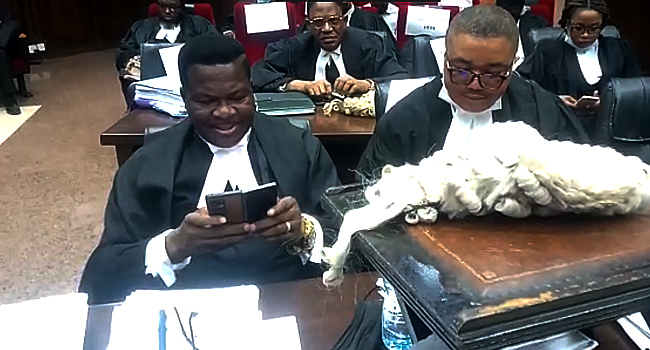The tobacco epidemic has for years adversely impacted the public health of several countries around the world, including Nigeria.
In 2012, for instance, the Global Adult Tobacco Survey (GATS), found that 5.6 per cent of Nigerians 15 years and older (4.5 million persons at the time) used tobacco products. The survey also found high and significant exposure to second-hand smoke (SHS) during visits to public places with a prevalence of 82 per cent in bars or nightclubs, 36.3 per cent in coffee shops, 22.3 per cent in universities and 29.3 per cent in restaurants.
Annually, tobacco-related illnesses claim 26,800 Nigerian lives and inflict debilitating conditions and non-communicable diseases like cancer, heart disease, and chronic respiratory diseases on thousands more. The economic toll is immense, costing billions in healthcare expenses and lost productivity. Additionally, tobacco cultivation exacerbates deforestation and soil degradation, while cigarette waste pollutes the environment.
The challenge is further compounded by the emergence of unregulated tobacco and nicotine products that target younger demographics and exploit gaps in the regulatory framework. These products, including electronic cigarettes and novel smokeless tobacco, are marketed as trendy despite their health risks. Moreover, tobacco companies in Nigeria continue to exploit weak monitoring systems to market their offerings aggressively on social media, as well as utilise corporate social responsibility (CSR) initiatives to gain favour with public health authorities, thereby undermining tobacco control laws and enticing more users into tobacco consumption.
The danger of tobacco consumption makes the need for robust countermeasures against the tobacco industry, and to dissuade youths from starting its use while encouraging users to quit, more critical than ever.
To counteract these threats, the Nigerian government must intensify its efforts in regulation and control, recognising the grave public health and economic impacts of tobacco use. To be clear, the Federal Government must respond with proportional investment in the TCF for the effective regulation of tobacco consumption.
Inadequacy of the Tobacco Control Fund
The current funding allocated to Tobacco Control is grossly insufficient to meet Nigeria’s comprehensive tobacco control intervention needs. In 2023, the national budget earmarked a mere ₦4.7 million for this purpose, a token that barely scratched the surface of what is needed. While the 2024 budget commendably doubled this allocation to ₦10 million and the 2025 budget increased it to N13 million, it remains insufficient for several critical reasons.
Firstly, operational costs consume a large portion of the funds. The National Tobacco Control Committee (NTCC) require substantial finance running in millions for the coordination of its meetings, which should occur at least four (4) times annually as stipulated by the National Tobacco Control Act (NTCA). The current allocation to the TCF, which provides support for these meetings, remains poor and, therefore, leaves virtually no financial room for this activity or other essential responsibilities of the NTCC.
Secondly, effective sensitisation campaigns need robust media outreach, deep community engagement, and active coordination with various stakeholders across the country. These activities require substantial funding to reach a wide audience and create impactful messages.
Thirdly, there is a pressing need for alternative cropping initiatives to support tobacco farmers transitioning to sustainable crops. This shift involves continuous investment in training programs, provision of quality seedlings, and adequate financial support to ensure that these farmers can move to more sustainable and health-friendly agricultural practices. Furthermore, enforcement and monitoring activities are crucial to combat industry interference and ensure compliance with tobacco control regulations. This includes prosecuting violations, safeguarding smoke-free spaces and ensuring a ban on tobacco advertising, promotion and sponsorship, amongst other efforts. Adequate funding is also essential to equip and train enforcement teams on the front lines of this battle, ensuring that regulations are not only in place but actively upheld.
What Nigeria must do
Recognising the critical public health and socio-economic implications of tobacco use, the National Assembly needs to take decisive action in addressing the chronic underfunding and operational challenges of the Tobacco Control Fund (TCF). Specifically, there is a need for the National Assembly to increase the tobacco control allocation to a minimum of ₦300 million in supplementary budgets and ensure subsequent increments in future budgets.
The current allocation of ₦13 million falls drastically short of the resources required to combat the growing tobacco epidemic and emerging nicotine product use effectively. An increase to ₦300 million would allow the National Tobacco Control Committee (NTCC) and Tobacco Control Unit (TCU) domiciled within the Federal Ministry of Health and Social Welfare to convene mandated meetings and implement robust public health campaigns to educate citizens about the dangers of tobacco use.
It would also make funds available for research initiatives to monitor trends in tobacco consumption and evaluate policy impacts, enhance enforcement efforts, including monitoring compliance with existing laws and prosecuting violations, and support alternative livelihood programs for tobacco farmers, ensuring that they transition sustainably to other crops.
There is also a pressing need for the full operationalisation of the National Tobacco Control Fund (TCF). The TCF was established under Section 8 of the Nigeria Tobacco Control Act (NTCA), 2015, as part of a comprehensive framework to combat the harmful effects of tobacco consumption. The fund is drawn from various sources, including appropriations from the national budget, proceeds of fines for violations of tobacco laws, and contributions from relevant development bodies for tobacco control.
By establishing the TCF, the federal government recognised the enormous public health risks posed by tobacco and the role of adequate financial resources to combat them. The TCF is intended to support vital activities such as public health campaigns, regulatory enforcement of the NTCA, research on tobacco trends, and alternative livelihood programs for tobacco farmers. However, since its creation, the Fund has yet to commence full operation, leaving Nigerians vulnerable to the unchecked dangers of tobacco consumption and marketing.
Tobacco control is an investment in Nigeria’s future. By fully operationalising the Tobacco Control Fund, ensuring transparent and accountable fund management, and bolstering the institutional capacity of relevant public health authorities to exercise their mandate, the National Assembly will be leading the charge in safeguarding public health, reducing economic burdens, and protecting the environment from the devastating impacts of tobacco.







